My classics aren't your classics
So how do i talk literature and old books when we don't have the same baseline?
As I said last week in my one year retrospective, i want to make this substack more about books, literature and speculative fiction (in general, not just books). It’s been a love of mine since literally forever, and i have lots to say about lots of things.
But one thing that keeps coming back, and that i keep being stumped by, is around the idea of writing stuff around books, for an american audience (because that’s 90% of you according to my stats), when i’m not only not american, but also not a native english speaker.
I had yet another experience of it this week: i wrote this little note about classics, which garnered some attention
And then came 2 of my worst nightmares – well, not actually, no one bullied me and i’m very thankful for that! I thought they were representative enough of all the things i fear when i speak about books on here.
Can you give me an example please?
Yes, sure! Let me think for a sec and find you an example of a book considered part of the classics, that’s easy to read, doesn’t require you to look at the footnotes, is enjoyable, is relatively short, doesn’t have weird references to things people would need to look up…
Oh wait, it also has to be in English! Because when you’re debating (that’s a big word, people were just nicely talking to me), you need to convince people, and the best way to do that is to find examples that resonate with them.
You know, The Princess of Clèves that we all read when we were 12 years old – no you don’t, because it’s a French classic, about the French nobility, in the kingdom of France, part of the national French curriculum.
Argh, let’s try again! A little play, funny, with lots of quiproquo, easy commentary on social classes that still so relevant today you don’t need any explanation to understand why that dude is being mocked and that this bit is sarcasm… Molière! The playwright of King Louis XIV of France, who founded the Comédie Française, and who is as widely studied as Shakespeare, in France!
Now you get the point, I won’t bore you with more random French books we teach kids (although do tell me if you’d like a list, i can totally build one of those classics guides i was putting down!).
The thing is, my classics aren’t yours, and i can’t come up with easy classics to read from my own experience at school. The English language classics i read as a child were all difficult, because i was learning the god-damned language they were written in! I’m sure if i picked up The Treasure Island today, it’d be a breeze, but the (extremely) abbreviated version i read at 13 was the hardest book in the entire world!
That’s also why i feel so strongly about those misguided guides of the classics: they are written by people who have usually never suffered to read them, and so they are often missing the mark in terms of how difficult they are to read. There is a difference in language, in how stories were told, in themes, pacing, vocabulary, … that makes it hard to get into a lot of classic books if you aren’t initiated. And when your guide is for beginners, the only thing i see is a random 15 years old wanting to be smart picking War and Peace up just to try and dying of boredom and never wanting to pick a book up again.1
I misspoke
Second nightmare of any socially anxious autistic overachiever non-native english speaker: i was misunderstood * gasp *
As soon as i dare to say anything nearly close to an opinion in a tongue i only halfway master, i get that awful though: what if they misinterpret what i wanted to say and think i’m a horrible horrible person who wants to kill all the puppies? WHAT WILL I DO THEN???
It’s all good and dandy when i get my usual 100 views on a long form essay (which means no one read past the third paragraph, and i’m generous), but when it’s 4 lines, on Notes, that goes “viral” (it’s 600 likes, but still that’s a lot for me!), then i reach my limit and i start to wonder if i really want to do this and seriously consider closing it all down.
In the case at hand, people though i was talking about prefaces, introduction and footnotes. I wasn’t, i was talking about the “How to get started reading the classics” listicles you can find on substack. And then i spent my afternoon of fame and glory trying to write that down in a tactful manner to explain to my kind commenters that, no, i’m not an anti-intellectualist who wants to ban footnotes and that yes, i do read classics on Kindle specifically so that i can pull up the definition of random words i don’t know (bonus point if their meaning has changed so completely since the time of writing).
Of course that’s all a “me” problem, and i need to focus on self-confidence, growing a thicker skin and all the stuff. But still, i write on substack to be adulated and grow into a thought-mother, not to be taken so off course!
Context, what context?
On that note, we really just don’t have the same context. I keep seeing post among post about the idea of the “western canon”, but on substack, the “western canon” is american + some british bits they learned at school, those 3 russian 80000pages novels, and that one French book that makes you sound cool (Proust, Flaubert, Monte-Christo – choose one).
And i’m not illiterate! I’ve read some Hemmingway, some Shakespeare, some Steinbeck. But did i really read Grapes of Wrath? No, i don’t think ok. Oh yes actually i did! It was called Les Raisins de la Colère on the front jacket though. Does it still count?
To go back to my point about classics guides: Grapes isn’t one i’d recommend to a French audience, because it’s so tied to the problems of its time, and we don’t really study the Great Depression as it happened in the USA. Does that mean French people shouldn’t read it? Of course not! It just means a French person vaguely wanting to “read classic books” shouldn’t start with learning all about that time in history in another country – it would be more enjoyable for them to pick up a French equivalent, idk, maybe Marcel Pagnol or Colette. They’ll find themselves more at home in a description of French rural life, with the French preoccupations of the time, with a political climate they learned about in history class!
And on the opposite side of “easy classics”, the harder ones are also that much harder to read when you don’t have the same cultural background. I feel like i can’t write about Shakespeare, because i didn’t study him in Literature class, i think that we necessarily have a very different experience of Proust when you picked it up voluntarily as an adult, whereas i read him in 3 weeks, wrote 4 dissertations on various passages, and was grilled for 1 hour by my teacher on a linear commentary of [insert passage] for a grade, all that at age 16.
It goes further than the mere cultural difference and the language barrier, studying in class is a different way of approaching the books, that puts you in a different mindset and lets you come away with different lessons. I saw [blogger] say the part she remembers the most about Du côté de chez Swann3 is [insert part], but what i remember most is [how it’s placed in the literary context].4
My favorite character in LOTR is Bilbon!
And now comes the death blow to writing about english language books on the internet, when you read them in your native language: which translation did you pick?
Because i can guarantee that my first experience of The Lord of the Ring was severely impaired by the frankly weird translation choices – like adding a “N” at the end of Bilbo, for some reason?
I mentioned earlier not always knowing if i’ve read a book or not, because i know it so much from its translated title (and Grapes of Wrath is literally a literal translation so it’s on the easier side!). The other side of the coin is the endless Wikipedia > change language > English searches i did all afternoon to get translated names of all my examples!5
I also got a very nice DM from someone wanting to read one of the recs, and asking which translation was best. But how am i to know that? The business of translations, how good/faithful/enjoyable they are, is obscure to me! I wouldn’t know where to find that information in the first place (please tell me if you do!).
And that’s for the great scenario in which the book was translated to English – because most of them aren’t! Especially in the scifi/fantasy/speculative worlds that i affectionate. So where do i find that quote to illustrate my point?
You known you should stop your little rant when you come back full circle: what if, when i find the translation of the quote i want, it’s actually saying the opposite of what i understood? What if i don’t find the same beauty to it, the same poetry, the same analogy? What if it was so mangled (and that’s very true for older works – they would say “improved for the benefit of the readers of the very special country of France”) that it doesn’t illustrate shit at all anymore?
I would say this is my third and most debilitating nightmare. being understood very well, while i confidently spit out a take from my confidently arrogantly arranged soapbox, that just happens to be completely false because i didn’t actually understand the book i was reading.6
End words
I’ve written all of this on my high horse, still kicking from all the adrenaline of having been seen by so many people. It’s not been edited much, but i thought it was important to say all that stuff, in a longer format that all the little notes i’ve been trailing around.
If you have any suggestions on how to get past some of those hurdles, i’m all ears. Otherwise, i’ll come back next week, maybe with a horror movie review? I haven’t done this in a while (i get too scared in the cinema) but i recently saw something really nice 👀
See you next time,
of course another 15 years old will pick it up and love it, but let’s be honest I (because i was that kid) didn’t need a guide to tell me how to do that! The kids who read those guides are the ones who need help and handholding, not the ones who can pick up anything and find themselves at home in it immediately
a great French poem you really don’t need a guide to read (if you speak the language) because just like classic novels, not all classic poetry is hard to parse and inscrutable without a class!
Swann’s Way
redacted because it felt aggressive and that’s not my point (i really like that blogger!)
And some of them are fucking weird: what do you mean Terre des Hommes is Wind, Sand and Stars???? Like yeah Saint-Exupéry was the plane-over-the-desert dude, but be for real!



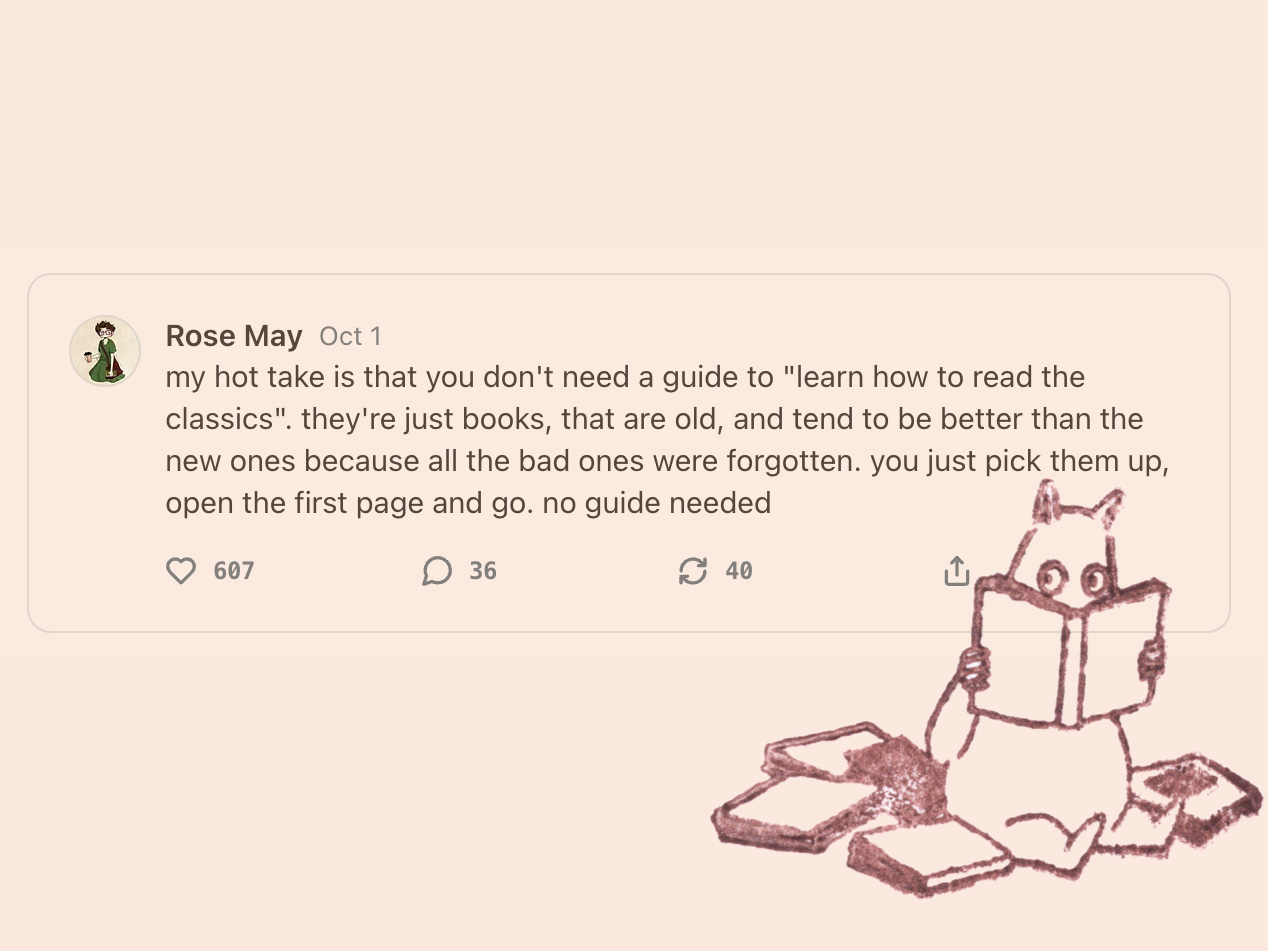
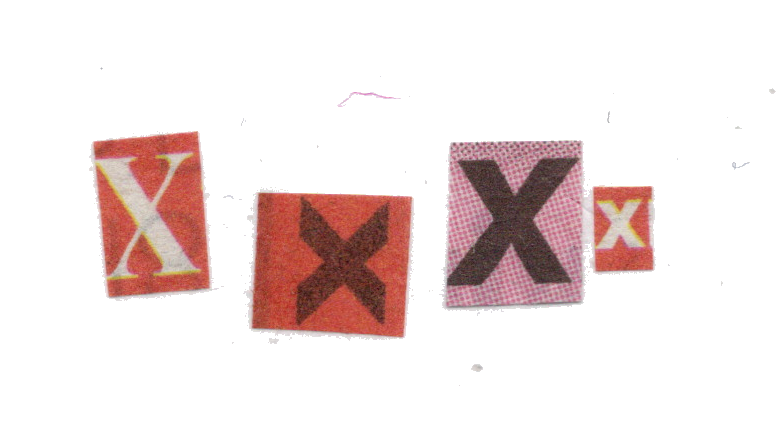

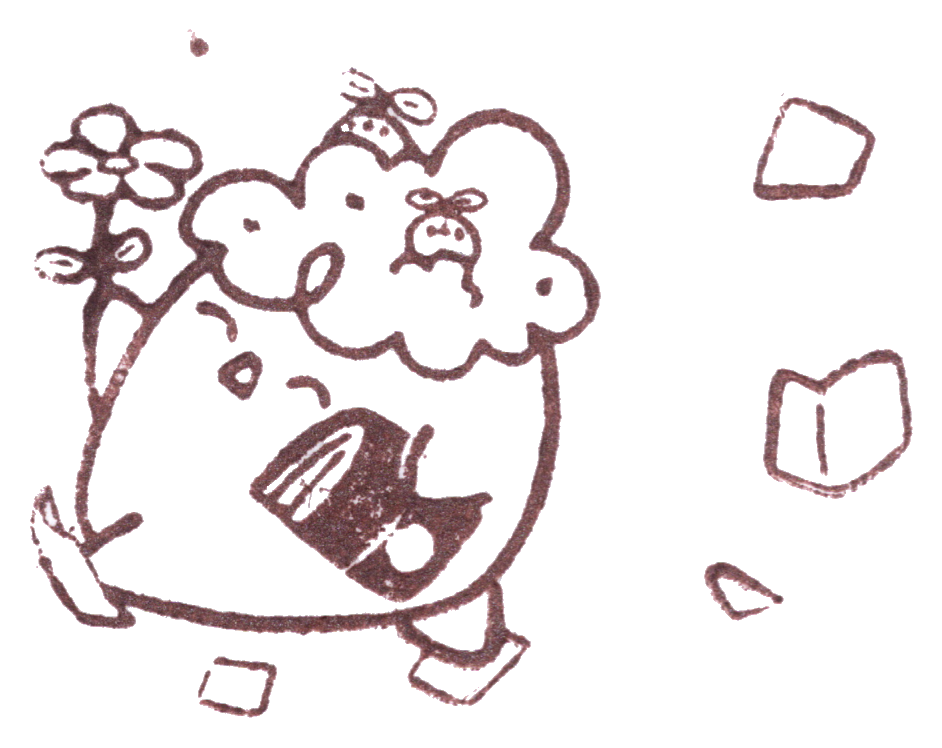
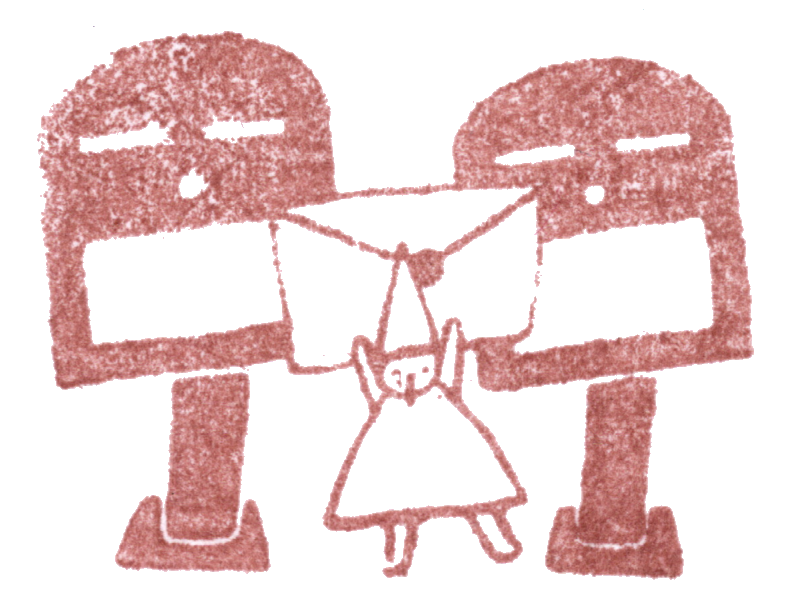
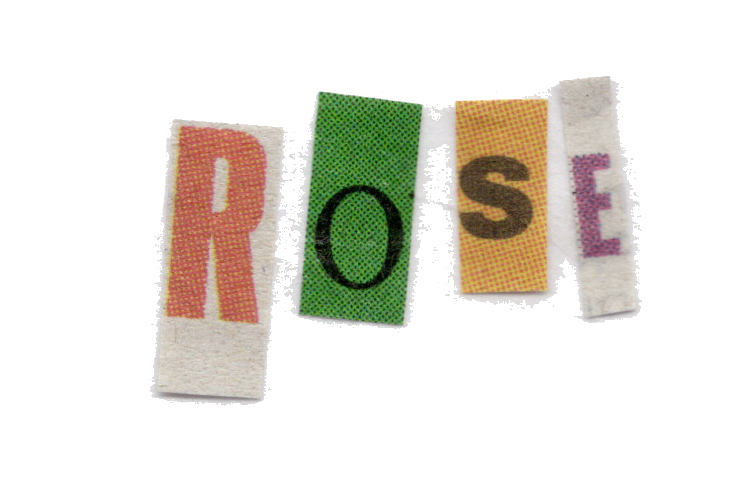

There may be a difference between classic books and canonical books. The "canon" implies a normative sense of "must read" while "the classics" is much more inclusive and vague, in a positive sense.
Most of the classics were originally intended for a popular audience and were not for an audience with exceptional comprehension ability.
However, the rather abysmal level of cultural education, at least in the U.S., makes it difficult for many new and aspirational readers to have much of a sense of context.